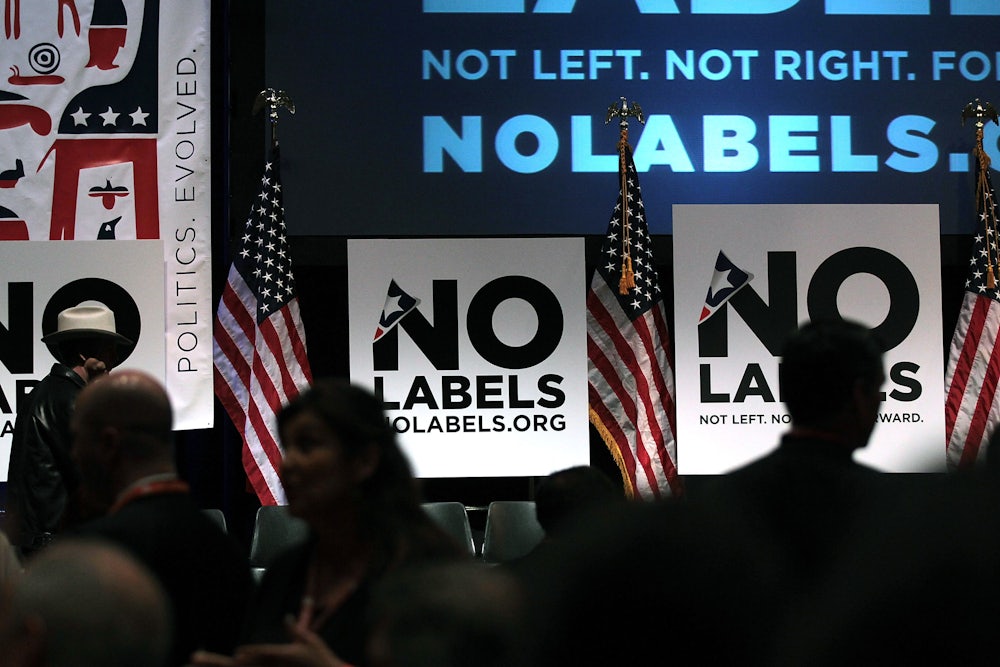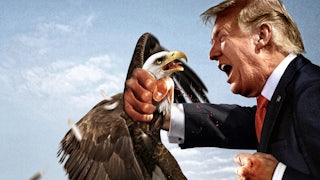There was a time when a certain set of moderate Democrats was the most tight-knit tribe of strategists within the party. They were more than just ideological acquaintances. They were even more than political allies. They were ideological soldiers fighting side by side to transform their party after two historic presidential routs in 1972 and 1984.
Take Al From and Mark Penn. Starting around the mid-1980s, these conservative-leaning Democrats were two of the key operatives in getting the Democratic Leadership Council–backed Bill Clinton to the White House. The DLC’s brand of third-way, moderate politics acted as the dominant counterweight to the liberal wing of the Democratic Party. The operatives associated with it were the ascendent strategists within the party.
Fast-forward to today though, and From and Penn are anything but allies. The DLC shuttered its doors more than a decade ago. Penn was ousted by Hillary Clinton’s first ill-fated presidential campaign in 2008 after it was revealed that his lobbying firm had a contract with Colombia to promote a free trade deal. About a decade after that, Penn found himself briefly meeting with Donald Trump, of all people, in the Oval Office—proof to many Democrats that Penn had always had at best loose principles. Penn’s ambidextrous approach to politics is on display today: He is also the CEO of the Stagwell Group, a private equity group with investments in a prominent Republican consulting firm and a marquee public relations firm run by some of the most powerful Democratic operatives closely connected to Joe Biden.
And Penn’s wife, Nancy Jacobson, runs No Labels, the purportedly hard-core moderate outside group currently working to prop up a serious third-party “unity ticket” in 2024. That ticket could spell doom for Joe Biden and Democrats hoping to keep control of the White House—and keep Donald Trump out of it.
And From? He has joined the noisy phalanx of Democratic moderates and liberals warning about the clear and present danger of a $70 million–backed No Labels ticket. “This time, what they’re doing seems to be more mischievous than anything else—and dangerous,” From said. The DLC, he explained, was built within the Democratic Party to win intraparty battles and help steer it in a direction that could win the presidency. From argued that No Labels instead “is basically a process-fundraising deal, from what I can tell. In this case it’s very dangerous.”
I asked From, who has known Jacobson since she was a young twentysomething political fundraiser for Dick Gephardt’s 1988 presidential campaign, if she could be convinced to stop this campaign. From shrugged. “I don’t know. I guess they could probably go to court to keep them off the ballot in some places,” he fretted. “Look, the way that that stops is for No Labels to stop it.”
From’s warnings aren’t unique among centrist Democrats. Jim Messina, the Montana-bred Obama reelection campaign manager prone to colorful language, suggested that Jacobson and Penn were straining for power and attention. They “are sort of no longer relevant within the party,” he told me, “so now they’re going outside the party looking for relevancy.” Messina also trashed the group as essentially fronting for Trump. “Besides giving directly to Donald Trump’s campaign, the best thing you can do to elect Donald Trump is to support No Labels,” Messina said.
Other groups agree. Former North Dakota Democratic Senator Heidi Heitkamp was an avowed moderate in her time in office. And recently, the One Country Project, a group she founded to advance a rural-America agenda, sent out a fundraising pitch warning: “No Labels is the ultimate insider group, a smug bunch of coastal elites who think they know better than the rest of us. We have to be clear about what they’re actually doing: clearing a path to send Donald Trump (or someone just like him) to the White House.” One Country executive director Tessa Gould, Heitkamp’s former chief of staff who wrote the pitch, continued: “No Labels won’t win, but they also won’t have to persuade many people to throw the election: even a weak No Labels showing could put as many as 79 Democratic electoral votes at risk.”
In a separate statement to The New Republic, Gould said One Country has been working with Third Way, a centrist think tank, and other groups to warn about No Labels because “it will undercut Biden and his administration, who not only came in with a rural agenda, but have successfully advanced it.”
One more Democratic strategist, who asked not to be named, agreed with Messina: “I think they are playing with fire, and this is all about relevance for [Jacobson] and her husband, Mark.” This strategist also asserted that, from a moderate Democrat’s perspective, Biden has been just fine: “Joe Biden has moved the Democratic Party to the right in my estimation. If you think about where the party was in 2020 and 2021 when he just got into office, it was pretty left. And he’s moved us to be a party that’s talking about jobs, salaries, working folks, benefits, creating more jobs and the economy. Those are all good things. Those are all things moderates want. So he is getting punished by the founders of No Labels for moving the party to the middle.”
These Democrats are walking a trail blazed by William Galston, the well-known political theorist at the Brookings Institution long identified with the party’s center. When No Labels was founded in 2010, Galston was one of its co-founders. Galston’s presence served as an example of how it had prominent support from both sides. But in April, Galston resigned in protest over No Labels’ 2024 unity ticket plans. Earlier this month in an op-ed in The Wall Street Journal titled “No Labels May Re-Elect Donald Trump,” Galston wrote that he “felt compelled to resign in disagreement over its decision to launch a bipartisan presidential campaign.”
Third Way has released an extensive analysis concluding that if No Labels does actually follow through with its plans to get on the ballot in 50 states and set up a “launching pad” for a third-party presidential ticket featuring a prominent Democrat and prominent Republican, that ticket would steal more votes from the Biden-Harris reelection campaign than the Republican ticket. An unlikely set of Democratic groups, spanning the liberal MoveOn to the Center for American Progress Action Fund to Third Way, have joined together to warn in a Washington Post op-ed about the No Labels unity ticket plan.
Third Way is in the process of convening a large conference of Democratic strategists, featuring Messina, former White House chief of staff Ron Klain, and a host of other Democratic operatives, to essentially figure out what to do about the third-party No Labels spoiler threat.
There’s a sort of irony to this anti–No Labels summit. After all, outside of opposition to extreme Republican conservatism, Democratic moderates and the ascendent liberal wing of the party basically never rally together. But self-preservation is a funny thing in that it can bring people together like nothing else. That’s what’s motivating even the most hard-core moderates to join with liberals. It’s also what has torn the once-tight network of Clinton-era moderates apart. People can say what they will about From and Messina and Heitkamp’s brand of Democrat, but at least they all would rather a Democrat of some stripe be in the White House instead of a Republican.






